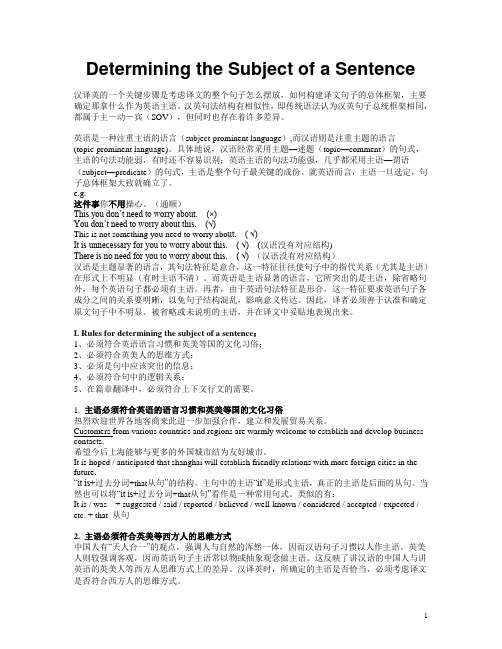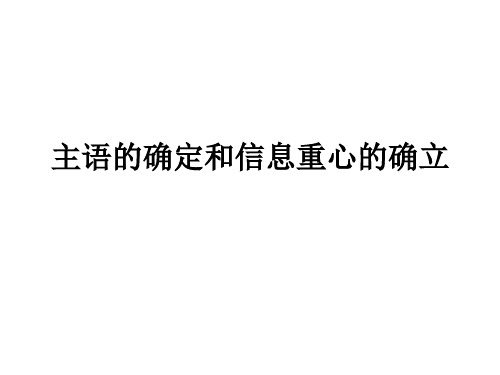2013 汉英翻译 主语的选择
汉译英之主语的选择全解课件

在汉语中,无主句和省略主句是比较常见的句型,但在英语中,无主句和省略主句的使用相对较少。在汉译英中 ,需要根据英语的表达习惯对无主句和省略主句进行处理,可以采用增补主语、变换句型等方法,使得译文更加 符合英语的表达习惯,提高译文的准确性和流畅性。
汉译英主语选择的
03
方法与技巧
直译法
总结词
功能
主语在句子中起到引导句子的作 用,是句子逻辑和语义的核心, 同时影响谓语和宾语的语法结构 和意义。
主语选择的重要性
01
02
03
语法正确性
选择正确的主语可以使句 子语法结构完整,避免出 现语法错误。
语义清晰性
选择合适的主语可以明确 动作的执行者或状态的变 化者,使句子的语义更加 清晰。
语境适应性
详细描述
在汉译英过程中,有时候原文中的一些词汇或短语在英文中并不需要翻译出来,因为它 们对于句子的结构和意义没有实质性的影响。省略法可以在主语选择时使用,例如在翻
译一些重复的词汇或短语时,可以省略其中的一部分,以使译文更加流畅、自然。
汉译英主语的特殊
04
处理
主谓一致的处理
主谓一致是指英语句子中主语和谓语动词在数、时态和语态上保持一致。在汉译 英过程中,需要根据英语语法规则,选择适当的主语形式,以确保句子结构正确 。
主语与谓语逻辑关系混乱
主语与谓语逻辑关系混乱是指英语主语与谓 语在逻辑上不一致,导致句子意义不明确。
在进行汉译英时,需要特别注意主语与谓语 的逻辑关系,确保它们在时态、语态和语气 等方面保持一致。例如,“如果明天下雨, 我们就不去公园了”应该翻译为“If it rains tomorrow, we won't go to the park”,
汉英笔译基础教程第10章 主语的选择[精]
![汉英笔译基础教程第10章 主语的选择[精]](https://img.taocdn.com/s3/m/2258dbc2d1f34693dbef3e1b.png)
(6) 别的介词短语作话题
例15. 为了这事情我真发愁。 译文:I am worried about this matter. “为了”可译为for,但介词的使用要看上下文,
这里由worry 决定。
(7) 主谓话题
把话题译成由介词 of、as for、 as to、as regards 等引导的介词短语,放在句首。例如:
例16. 城市里行路难、乘车难,已经成了最为严重的社会 问题之一。
译文:Urban residents find it extremely difficult getting to and from their destinations, which has become one of the most serious social problem.
(6) 以物作主语 汉语主语中如果是人,有时可以翻译成英语中的
物作主语。有些句子的表达得好可以避免中式英 语的感觉。例如:
例6.我最近常常想起您和贵国。 译文:You and your country have been
much in my thought recently.
译文把宾语作为主语来翻译。译文的这个用法比 have often thought of you地道。
译文3:We will unswervingly focus on economic development, press ahead with reform and opening-up, maintain social stability and pursue the independent foreign policy of peace.
译文2:We will steadfastly focus on economic development, resolutely press ahead with reform and opening-up, persistently maintain social stability and unswervingly pursue the independent foreign policy of peace.
汉译英之主语的选择全解课件

例如:使用我们的护肤品,让你的肌肤焕发 年轻光彩,重拾自信美丽。
06
总结与展望
汉译英主语选择总结
明确句子主谓关系
在翻译过程中,首先需要明确原 句的主谓关系,即确定句子的中 心思想,这将有助于我们选择合
适的主语。
避免冗余和歧义
在翻译过程中,要注意语境对主语选择的影响。不同的语境下,可能需要选择不同的主语 。例如,在描述一个物体的位置时,汉语中通常使用物体作为主语,而英语中则更倾向于 使用地点作为主语。
根据语言习惯选择主语
在翻译过程中,要注意不同语言习惯对主语选择的影响。不同语言习惯下,主语的类型和 位置可能会有所不同。因此,在翻译时要注意根据目标语言的习惯选择合适的主语。
02
例如:在2023年,中国成功发射 了嫦娥五号月球探测器,实现了 中国航天史上的又一里程碑。
科技文献类实例分析
科技文献类文章通常以“事物”或“ 现象”作为主语,以此来突出科学的 严谨性和客观性。
例如:在量子力学中,波粒二象性是 一个非常重要的概念,它指的是粒子 可以同时具有波和粒子的属性。
广告文案类实例分析
02
汉译英主语选择影响因素
语境因素
语言环境
在翻译过程中,需要考虑原文所处的 语言环境,以及该语言环境下的语法 和词汇特点,从而选择合适的主语。
文化背景
不同的文化背景可能会影响主语的选 择。在某些文化中,可能更倾向于使 用无主语句,而在其他文化中则可能 更常见使用主语。
主题因素
主题明确性
在翻译过程中,需要考虑原文的主题是否明确,以及主题对主语选择的影响。
主题复杂性
如果原文的主题比较复杂,可能需要拆分句子结构或者使用从句等方式来处理 ,以避免出现复杂的主语。
汉译英主语的确定

Determining the Subject of a Sentence汉译英的一个关键步骤是考虑译文的整个句子怎么摆放,如何构建译文句子的总体框架,主要确定那拿什么作为英语主语。
汉英句法结构有相似性,即传统语法认为汉英句子总统框架相同,都属于主-动-宾(SOV),但同时也存在着许多差异。
英语是一种注重主语的语言(subject-prominent language),而汉语则是注重主题的语言(topic-prominent language)。
具体地说,汉语经常采用主题—述题(topic—comment)的句式,主语的句法功能弱,有时还不容易识别;英语主语的句法功能强,几乎都采用主语—谓语(subject—predicate)的句式,主语是整个句子最关键的成份。
就英语而言,主语一旦选定,句子总体框架大致就确立了。
e.g.这件事你不用操心。
(通顺)This you don’t need to worry about. (×)You don’t need to worry about this. (√)This is not something you need to worry abo ut. ( √)It is unnecessary for you to worry about this. ( √) (汉语没有对应结构)There is no need for you to worry about this. ( √) (汉语没有对应结构)汉语是主题显著的语言,其句法特征是意合,这一特征往往使句子中的指代关系(尤其是主语)在形式上不明显(有时主语不清)。
而英语是主语显著的语言,它所突出的是主语,除省略句外,每个英语句子都必须有主语。
再者,由于英语句法特征是形合,这一特征要求英语句子各成分之间的关系要明晰,以免句子结构混乱,影响意义传达。
因此,译者必须善于认准和确定原文句子中不明显、被省略或未说明的主语,并在译文中妥贴地表现出来。
汉译英——主语的确定

三.所选主语必须符合英美人的思维视角.
1. 她从来没想到他是个不诚实的人。 It never occurred to her that he was a dishonest man.
2. 由于计划不周,他不仅浪费了时间,而且 浪费了所有的钱。 • Poor planning wasted all his money as well as his time.
7. 调查研究能解决这个难题。 • This problem can be solved through investigation. • Through investigation, this problem can be solved. • Investigation will enable this problem to be solved.
11. 从王教授那里能解决这个难题。 • We/ One /You can solve this problem with the help from Professor Wang. • This problem can be solved with the help from Professor Wang. • With Professor Wang’s help, this problem can be solved. • Professor Wang’s help means the solving of the problem. 12. 把技术人员的积极性调动起来能解决这个难题。 • This problem can be solved by bring into play the positive factor of the technical staff. • Bring into play the positive factor of the technical staff, and this problem can be solved. • The solution of this problem lies in bring into play the positive factor of the technical staff.
汉译英主语的选定

4. 主语为偏正结构短语
肥沃的土壤有利于作物的生长。
The richness of soil favors the growth of crops.
除了其传染性,该疾病的严重状况最终导致肺结核。 In addition to its contagiousness, the severity of the disease resulted in tuberculosis.
3. 主语为动宾结构短语 发明计算机是人类历史上的一大奇迹。 The invention of the computer is a marvel in human history. 操作电机需要了解电机的一些性能情况。 The operation of an electric machine needs some knowledge of its performance.
5. 主语从句 除地球外的任何别的行星上是否适合生命存在,是值得怀疑的。
Whether life can exist on any planet other than the earth is very doubtful. 理论必须紧密联系实际是我们应当记住的一条原则。 That theory must go hand in hand with practice is a principle we should always keep in mind.
要创造新物质,就需要一个超热和高能的环境。 Creation of new matter requires an exceedingly hot and energydense environment.
(目的状语译为主语)
(完整版)2013汉英翻译谓语选择
谓语必须与宾语在逻辑上搭配得当
1. 抓紧施肥
1. pay close attention to or attend
2. 取得成就
to the task of manuring
2. 今晚有人在此讲了些不该讲的话。
Some things were said here tonight that ought not to have
been spoken.
3. 众所周知,中国人在四千年前就发明了指南针。
It is well known that the compass was invented in China four thousand years ago.
After-class practice for last lecture
1. Attitudes towards retirement vary from person to person.
2. Some people think that they will enjoy their time in retirement,
After-class practice for last lecture
5. Others have already prepared themselves for the significant change in their lives.
6. Tired out after all exhausting life revolving around work, they are anxious to relax in retirement with all the strains relieved.
通过汉英句法差异对比看主语翻译技巧——以《匆匆》中英文本为例
通过汉英句法差异对比看主语翻译技巧——以《匆匆》中英文本为例发表时间:2013-10-11T09:28:50.670Z 来源:作者:王方[导读] 很多情况下,如果按照汉语的句式生搬硬套,译文的可读性就会大大降低。
王方陕西师范大学外国语学院710062摘要:本文从汉英句法的具体特征出发,主要以著名散文家朱自清的名篇《匆匆》中文文本和朱纯生的英译本为例,从主语、谓语、句与句之间的关系三个角度,考察汉英句法的不同之处,并着重分析了汉英翻译时句子主语的处理细节。
同时提出,我们在翻译时要充分考虑到汉英句法的差别,处理主语时要认真考虑、灵活对待。
关键词:汉英句法对比《匆匆》汉英翻译不同的思维方式导致汉语和英语两种语言在句子的概念、类型划分和组合机制等方面都具有很大差别。
两种语言的句法都有着各自的特征,即使是传达相同的信息,表达大多时候也不尽相同。
我们在翻译时要了解这些区别,全盘考虑。
著名散文家朱自清的名篇《匆匆》行文优美,具有典型的汉语句式特点,而朱纯生的译文用地道的英语表现出了原文的韵味。
本文主要以这两个文本为例,分析了汉英句法的不同特征,并讨论了汉语句子在翻译成英语时如何处理主语。
一、汉英句法对比“汉语为语义型语言,着力考究‘字’与语义及其相关关系,注重内容的意会性;而英语为语法型语言,重点研究主谓序列及其相关词类,句子结构受形式逻辑制约,注重形式的严谨。
”具体可以从以下三个方面进行分析:1.汉英句子主语的区别。
汉语句子“主语可由诸多不同类别的词语充当,主语隐含不显或无主语句的情况时常可见”;而英语句子“主语突出、易于识别,且只能由名词或名词性的词语担任”。
例1.去的尽管去了,来的尽管来着,来去的中间,又怎样的匆匆呢?Those that have gone have gone for good, those to come keep coming; yet in between, how swift is the shift, in such a rush?此例中,汉语句子就没有明显的名词或名词性的主语,“去的”、“来的”两个形容词做了主语,后面的问句干脆就没了主语。
论在汉译英中主语的选择 ——以张培基《英译中国现代散文选》为例
论在汉译英中主语的选择——以张培基《英译中国现代散文选》为例摘要翻译是两种语言间相互转换的语言活动。
在汉译英中,我们面临的任务之一是选择合适的词做主语。
然而,由于英汉语言间存在较大差异,我们在汉译英过程中选择主语并不容易。
汉英主语在形式和构句方面存在差异,而且汉语注重话题而英语注重主语。
本文从对这些差异的分析入手,通过对张培基《英译中国现代散文选》的学习以及本人自身的实践和总结,在汉译英主语选择方面提出了一些方法和建议。
一、保留原文主语作译文主语,二、选择原文的其他句子成分作译文主语,三、在译文中增补主语,四、减少改变主语。
进而得出结论。
在汉译英选择主语时,我们应该现在英美人的思维方式上考虑,结合英语的语言习惯,充分理解原文,运用一些技巧选择合适的主语。
关键词:汉译英;主语的选择;英汉主语的差异;张培基;英译中国现代散文选AbstractTranslation is a language activity of transforming between two languages. In the process of Chinese-English translation, choosing the suitable words as subjects is one of the tasks people facing with. However, it's not easy for people to choose subjects in Chinese-English translation because of the differences between Chinese and English. The subjects of Chinese and English have differences in forms and sentence structure. Furthermore, Chinese is topic-prominent language and English is subject-prominent language. This thesis begins with these differences, puts up some methods and advises about how to choose a suitable subjects through learning Selected Modern Chinese Essays by Zhang Peiji and the author own practices and conclusion. First, keeping the subjects of the original sentences. Second, choosing other constituents of the original sentences. Third, replenishing new subjects for the translation. Fourth, reducing of changing the subjects. And then, the writer shows the conclusion that it should be considered the mode of thinking in western countries, combining with the English language habits, fully understanding the origin text, and use some skills to choose the appropriate subjects.Key words: Chinese-English Translation;the choice of subjects;the differences of subjects in English and Chinese;Zhang Peiji;Selected Modern Chinese EssaysContentsAbstract (I)1.Literature Review 01.1 Existing Researches on this Topic 01.2 Purposes and importance of the study 02. Differences between Chinese and English Subjects (1)2.1 In Forms (1)2.2 Topic-prominent Language vs. Subject-prominent Language12.3 In Sentence Structure (2)3. Methods of Choosing the Subjects in Chinese-English Translation 23.1 Keep the Subjects of the Original Sentences (3)3.2 Choose other constituents of the Original Sentences (3)3.2.1 Choose the Objects to be the Subjects (4)3.2.2 Choose the Adverbials to be the Subjects (4)3.2.3 Choose the Attributives to be the Subjects (6)3.2.4 Choose the Predicates to be the Subjects (6)3.3 Replenish New Subjects for the Translation (6)3.3.1 Replenish the Suppressed Subjects of the Original .. 73.3.2 Replenish the Impersonal Pronoun “It” (7)3.4 Reduce of Changing the Subjects (8)4. Conclusion (9)Bibliography (10)Acknowledgements (10)1.Literature Review1.1 Existing Researches on this TopicMany scholars discussed the translation of Chinese and English sentences from the perspective of differences between Chinese and English subjects. According to the existing research, there are many different forms of expression between Chinese and English, which can be divided into topic-prominent language and subject-prominent language, covert subject and overt subject, parataxis and hypotaxis in sentence structure, personal subject and impersonal subject. These studies focus on the analysis of subjective differences between Chinese and English languages, but the discussion of subjects in Chinese-English translation is relatively less detailed. In the book Chinese-English Translation Studies and Practice written by Ji Dequan (2005: 105), who puts forward five principles of determining the subjects in Chinese-English translation: "(1) It must conform to the English expression and the background. (2) It must conform to the English way of thinking ". (3) It must be the information that should be emphasized in the sentence. (4) It must follow the logical order of the sentence. (5) It should meet the context of the request ". In addition, Liu Miqing (1992: 37:46) has concluded in his book Contrast and Translation of English and Chinese three specific methods of selecting the subjects in the procession of translating Chinese into English, which are equivalence, shift, and supplement. These studies provide translators with some theories, principles, and strategies to choose the subject of Chinese to English translation.1.2 Purposes and importance of the StudyThe main purposes and importance of my paper can be summarized as the following two aspects. First of all, as a famous translator and translation theorist, Zhang Peiji made a great contribution to the translation of Chinese papers. The qualities and standards of the articles which he translated are very high. His Selected Modem Chinese Essays was widely accepted by readers and scholars to help spread the Chinese culture, so his translation of the paper worthy of translators’ unremitting study, they learned a lot, so as to improve translators’ ability to translate; the other aspect is that there is no denying the important role of the subject in shaping and constructing sentences in both Chinese and English. They also have a significant impact on the cohesion of sentences,but because of the differences between English and Chinese subjects, translators choose an appropriate subject from Chinese into English as a challenge, so it seems that it should be investigated and made detailed use of some useful translation techniques and strategies to help translators’ determine the subject of Chinese to English translation. Zhang Peiji's Chinese prose translation has set a good example in choosing the appropriate subject, so the author chose to analyze own translation works together with him and explore the method of choosing the subject.2.Differences between Chinese and English SubjectsChinese and English belong to two different language families, therefore Chinese finds its root in the Sino-Tibetan Language Family, while English belongs to Indo-European Language Family. Differences exist between the two languages, one of which is the difference between their subjects, so as bring difficulties to us in English learning and Chinese and English translation. This chapter will generally discuss the differences between Chinese and English subjects mainly in the following three facts.2.1 In FormsChinese subjects are diverse and highly compatible. Wei Zhicheng (2003) points out that all kinds of words, phrases and clauses can be used as Chinese subject. Liu Miqing (1992) argues that, due to the diversity of Chinese characteristics, the Chinese language features, almost any form of expression can be directly used as the subject of Chinese, or in other words, topics, such as nouns, verbs, adjectives, quantifiers or any other words, phrases or terms, we consider them to be "topics" rather than "subjects". “TmS (time subject), PlS (place subject), DaS (subject matter), MrS (modifier subject) Chinese subject” (Liu Meiqing, 1992: 39). Unlike Chinese subjects, English subjects are less incompatible and form singular, because they must be nominal. Thus, noun and subject pronouns can be used as subject of English, and as for other non-nominal words, phrases or clauses, if you want to use them as subjects of English, you must change their form and make them nouns.2.2 Topic-prominent Language vs. Subject-prominent LanguageAccording to Li and Thompson (1976) theory, different languages can be divided into four categories, namely the subject-prominent language, thetopic-prominent language, both the subject-prominent and the topic-prominent language, neither the subject-prominent nor the topic-prominent language. And they show that Chinese belongs to the topic-prominent language which is the informational units of topic and comment that are basic to the structure of sentences, while English is the subject-prominent language which is the grammatical units of the subject and predicate that are basic to the structure of sentences. English focuses more on the relationship between the subject and the actor and the action, and the performance of the behavior can be found in the close grammatical relationship between the English subject and the predicate. This is not the same as Chinese. Zhao Yuanren (1979) said that only about 50% of the relationship between the Chinese subject and the predicate reflects the relationship between the actor and the behavior, so it is best to be the Chinese subject and predicate as the topic and comment. This also explains why Chinese subjects are more diverse than English subjects.2.3 In Sentence StructureFrom the above discussion, you can conclude that that English emphasizes the subject. They are indispensable in constructing sentences. In most cases, the subject is the starting point, the center and the must in English sentences. Often using the formal subject "it" can also be a good explanation of the English subject is indispensable. They have a decisive grammatical function and have a comprehensive and close relationship with the whole sentence. In English, the subject decides the number of predicates, so it should be consistent with the subject when the sentence is constructed. “The main body and the predicate form the seven main English sentences, namely SV, SVC, SVO, SVA, SVOO, SVOC, SVOA.” (Quirk, R., Greenbaum, G. Leech & J. Svartvik, 1985: 721). These forms of sentences also reveal the importance of English subjects. Chinese sentences are more flexible and do not have to follow strict sentences as English. As for the Chinese subject, they are not indispensable in the sentence structure and are not related to the form of the predicate. No subject sentences are common to meet in Chinese, and in many cases the subject can be omitted.3.Methods of Choosing the Subjects in Chinese-English Translation3.1 Keep the Subjects of the Original SentencesFrom the analysis and discussion in section two, translators understand that the subject of English sentences is mainly nouns, subjective pronouns or nominal words. If the original Chinese has a clear subject, and the subject is composed of nouns or subjective pronouns, and in line with the English primitive order, which is the thematic progression pattern. And then the translation of the original subject can be used as the subject of English translation. This is the easiest and most reliable means of choosing a subject in Chinese to English translation.(1)这激流永远动荡着,并不曾有一个时候停止过,而且它也不能够停止;没有什么东西可以阻止它。
英汉互译理论与实务课件及其参考答案 第三章第七节主语的选择
❖例 6 : My conscience told me that I deserved no extraordinary politeness. ❖译文:凭良心讲,你待我礼貌有加,我却受之有愧。 ❖ 英语原句中的主语是非生命的“My conscience”,汉语 译文中将其改为“凭良心讲”,将 “你待我礼貌有加” 这个主题提到了前面,这样的表达更加符合汉语的表达习 惯。
❖ Famous mountains in various places would find him coming back for revisits during different seasons.
❖ There he was, marveling at the kaleidoscopic spectacles during the different hours of the day.
❖ 中国人有“天人合一”的观点,强调人与自然的浑然一 体,因而汉语句子习惯以人作主语。
❖ 英美人则较强调客观,因而英语句子主语常以物或抽象 观念做主语。这反映了讲汉语的中国人与讲英语的英美 人等西方人思维方式上的差异。
❖ 汉译英时,所确定的主语是否恰当,必须考虑译文是否 符合西方人的思维方式。
R
❖ 例3:众所周知,神舟五号载人飞船在2003年成功升空。 ❖ 译 文 : As is known to all, 2003 saw the successful launching of China’s Shenzhou V manned spaceship. ❖ 英语中常有以时间或地点作为主语,以witness、see、 find作为谓语动词,表示某时某地发生了某事。 ❖ 这种非生命体作主语的现象不仅反映了英语思维的开放 性、认知性,而且反映了英语思维的客观性、准确性和可 分析性。(曹静,2009:47)
- 1、下载文档前请自行甄别文档内容的完整性,平台不提供额外的编辑、内容补充、找答案等附加服务。
- 2、"仅部分预览"的文档,不可在线预览部分如存在完整性等问题,可反馈申请退款(可完整预览的文档不适用该条件!)。
- 3、如文档侵犯您的权益,请联系客服反馈,我们会尽快为您处理(人工客服工作时间:9:00-18:30)。
• 沉默呵,沉默呵!不在沉默中爆发,就 在沉默中灭亡。--《纪念刘和珍君》
• Silence! Silence! Unless we burst out, we shall perish in this silence!
1. 2. 2 主语必须是句中应该突出的信息
1. 这次国家调动了 160 万军队去帮助守护大堤, 将被洪水淹没地区的百姓迁走。 1.6 million troops have been mobilized to help protect the dikes and to move people out of areas being flooded.
Determining the Subject of a Sentence
主语的选择
1. 2. 3. 4. 5. 6. 7. 8.
钱你不用还了。 这锅饭能吃十个人。 这匹马骑着两个人。 被人缠上是件讨厌的事儿。 老子打儿子, 天经地义。 上面坐着主席团。 从她那儿能找到解决问题的办法。 说的是古代的一个老头,名叫愚公。
七大主要英语的主语
1. 施动主语 (agentive subject): Susan is growing flowers. 2. 受动主语 (affected subject): Her books translate well. 3. 工具主语 (instrumental subject): A stone broke the glass. 4. 地点主语 (locative subject): The jar contains h重主题的语言”(topic-prominent language) ,是话题评论式的。 汉语:话题+评论/说明 英语是“注重主语的语言”(subject-prominent language )。英语的主谓是施事行为式的。 英语:主语(施事者或受事者)+谓语(行为)
1. 这时我激动得说不出话来。 Words failed me here. More examples: ① 我昨天收到你的信。 Your letter reached me yesterday. ② 我一时记不起他的名字。 His name escaped me.
2. 不同的人对退休持不同的态度。 Attitudes towards retirement vary from person to person. 3. 她从来没想到他是个不诚实的人。 It never occurred to her that he was a dishonest man. 4. 我害怕起来了,而且越来越害怕。 Then fear set in and commenced to build up.
• 方鸿渐看大势不佳,起了恐慌。洗手帕, 补袜子,缝纽扣,都是太太对丈夫尽的 义务。自己凭什么享受这个权利呢?
• The whole situation with Miss Su made him feel uneasy. Washing handkerchiefs, mending socks, and sewing on buttons— these were the little chores a wife perform for her husband. On what basis was he enjoying these privileges?
5. 大多数高校已将权利下放给系主任。 In most colleges and universities,the decision-making rights have been given to department heads. 6. 明年将出版更多的儿童读物。 More books for children will be published next year.
必有主语,但以动词为核心,主谓间互相制约
汉语主语(被陈述的话题)
• 汉语主语是谓语说明的对象,可以是名词、代 词、数词、量词,或者动词短语、主谓短语等, 如:
• • • • • • • 1 2 3 4 5 6 7 这本杂志我不看了。 那边正在卖冰激凌。 西瓜吃完了。 小和山顶上开了一家酒吧。 这么快就挂了? 那个班的同学,十有八九是德国人。(外位语) 这些教材我们自学很容易。
给国家纳税是天经地义的事。 It is only right and proper that we should pay taxes to the state.
1. 1
汉英主谓结构的差异
“(主谓)这种句子(即使把被动的动 作也算进去,把‘是’也算进去)的比例是 不大的,也许比50%大不了多少。因此,在 汉语里,把主语、谓语当作话题和说明来看 待,比较合适。” —— 赵元任《汉语口语语法》
1. 2. 3. 4. 5.
6.
7. 8.
You don’t have to pay it back/repay the money. This pot of rice can feed ten people. On the horse were riding two people. It is annoying to be pestered/troubled. It is perfectly justified for a father to beat his own son. On the platform were sitting the members of the presidium. We can turn to her for a solution. The story is about an old man named Yugong in ancient times.
1. 2
主语选择的原则
① 无主句必须添加必要的主语 ② 必须是句中应该突出的信息; ③ 必须符合英美人的思维视角; ④ 必须符合英语的逻辑搭配习惯; ⑤ 必须符合行文连贯的需要。
1. 2. 1
无主句翻译,添加必要的主语
1. 起大风了。 It is blowing hard. 2. 改革开放胆子要大一些,要敢于试验。 When it comes to reforms and opening-up, we must be courageous enough to venture on experiments. 3. 北静王笑道:名不虚传,果然如“宝”似“玉”。 “ You live up to your name,” remarked the prince. “You are really 1ike precious jade.”
4. 上海采取了一系列的优惠政策来吸引 外资。 A series of preferential policies have been adopted in Shanghai to attract foreign capital. 5. 有心栽花花不开,无心插柳柳成荫。 A carefully bedded flower may not blossom while a casually planted willow may survive and thrive.
汉语中用地名、时间、工具作主语很普遍
1. 昨晚抓住了三个小偷。 Three thieves were caught last night. 2. 一把菜刀闹革命。 His revolution started with a kitchen knife.
3. 校园东头盖了一栋房。 A house has been built on the east of the campus.
5. 得第一名获金牌,第四名什么也拿 不到
Whoever comes first wins a gold medal but anyone who comes fourth
gets nothing.
• 6 不要有了新亲,把旧亲忘个干净!这种 没良心的人我见多了!--《围城》
• Once you have new relatives, don’t forget the old ones. I’ve seen too many such ungrateful people.
中国人在表达思想时十分注意主体意识, 常以有生命的、具体的名词或代词作主语, 多用主动语态和无主句。有时主语虽省略, 主体意识仍然强烈,读者容易体会到。如: 找工作处处碰壁,搞得我心乱如麻。 MY jobhunting has failed again and again and it made me terribly upset.
7. 热烈欢迎世界各地客商来此建立和发 展贸易关系。 Customers all over the world are warmly welcomed to establish and develop business contacts with us.
1. 2. 3 主语必须符合英美人的思维视角
2. 人们已把李白的诗集译成了多种外国文字。 The collection of Li Bai’s poems has been translated into many foreign languages. 3. 到去年年底,上海已与好几个国家签订了 建造拉索桥的合同或协议。 By the end of last year,contracts or agreements were signed with some countries for the construction of chain bridges in Shanghai.
英美人则较强调客观,注重客观事物对人的影 响和作用,因此无生命、抽象的名词作主语远 比汉语中多。英语这类非人称主语句采用“无 灵主语” (inanimate subject),表示抽象概念、 心理感觉、事物名称或时间地点等,但谓语却 常常使用“有灵动词” (animate verb),表示人 或社会团体的动作和行为,如 see , find , bring , give , escape , surround , kill , deprive , seize , send , know , tell , permit , invite , take , drive , prevent. . . from等。
